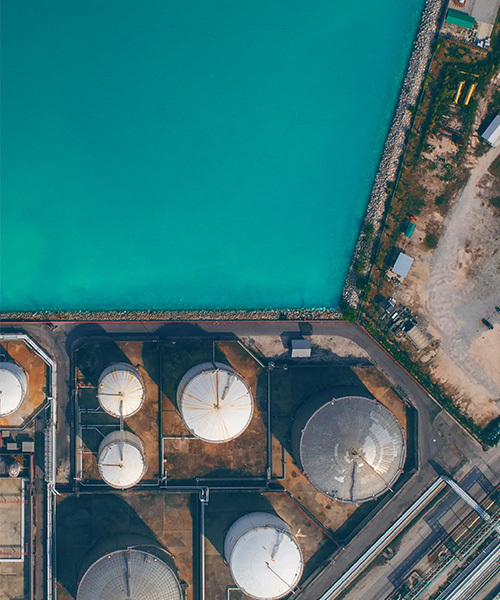October 15, 2020 • 5 min read
What steps can refiners take to future proof their businesses?
Angela Robledo looks at how refiners can improve their operations and future proof their businesses
Refiners need to adapt to a changing fuels landscape. They’re under pressure to a financial return, meet stricter environmental regulations and embrace decarbonization. But it’s difficult to make progress on all three at once.
What can refiners do to strike a balance that meets the expectations of all their stakeholders?
Weighing up new investments against maintaining refining margins
There are many investment opportunities available to refiners. Big investments can provide equally large returns. But when refining gross margins are low, major capital projects are often delayed or cancelled.
Low investment alternatives include improving the site’s energy efficiency to save on utility costs. Adopting an operational excellence program will improve the overall performance of the refinery. Implementing predictive asset management technology to anticipate critical equipment failures and avoid unexpected shutdowns. And finally, divesting assets to third parties or integrating with nearby facilities to find common synergies.
For medium to large projects, such as bottom of the barrel upgrades or the production of biofuels or petrochemicals, a larger investment is needed. However, they can offer profitable returns.
These projects are already being done in North America and Europe in response to changing renewable energy and lower carbon fuels legislation. We’re working with our customers to convert two oil refineries to make biofuels from waste and vegetable oils. This will reduce the plant’s greenhouse gas emissions by up to 50 percent.
Another option available is petrochemicals integration. However, making changes to the refinery’s configuration is challenging. This is because demand for petrochemical products is increasing at a higher rate than transport fuels, driven by macroeconomic factors such as population growth, urbanization and an increase in plastic waste.
While a full petrochemicals integration for a refinery is costly, there are capital efficient solutions. We recognize that each refinery has its unique configuration and challenges. This means we can create a bespoke offering for our customers that looks at viable integration routes from available streams within the refinery to produce the right petrochemicals for that market.
Expanding the refinery's services portfolio
We’re already helping refineries expand their portfolios by adding a renewable energy hub. We’re also helping refiners integrate into a new or existing supply chain. Investing in these can add flexibility and competitiveness to their portfolio. We look at factors such as availability of land, the location of the refinery, market demand, and environmental regulations to help refiners find the right solution.
Refiners can also explore the addition of renewable energy on site. Power consumption is often the main contributor to utility costs. These may be reduced by installing a solar or wind farm. But it’s important to find out if this is feasible. We recently completed a study for a gas processing plant to evaluate the production of electricity and steam via renewable energy. We considered concentrated solar power and solar photovoltaic technologies and wind turbines. And studied the integration with the existing steam and power cogeneration plant, and the capital investment and land required for each option.
Refiners wanting to reduce their natural gas costs and become greener are looking at the production of renewable hydrogen. Instead of using natural gas to produce hydrogen, refiners can install an electrolyzer. The implementation costs are currently high, but we’re helping our customers study the economies of scale for the available technologies. We look at options to integrate renewable hydrogen into the existing refinery hydrogen network, and provide advice on operation controls, storage and logistics requirements.
From a supply chain point of view, where refiners pay a high price for gas or suffer from gas supply shortages, one solution could be an LNG terminal. This is particularly relevant if they have access to a marine port. Once built, the terminal provides LNG at a lower purchase price, increasing the refinery’s gross margin. It also adds flexibility and competitiveness to the overall gas supply network, from which the refinery and other nearby gas users will take a commercial advantage.
Looking to a future beyond refining
There is also the scenario where refiners who are making very low or negative margins may have to shut down their assets. We are already seeing major international companies announce the closure of some of their refineries in the US, Europe and Asia.
So, what options do refiners have once their assets are no longer operating? They can sell their assets to buyers, often from developing countries, who are willing to purchase entire refineries and relocate them. For refiners having multiple sites in one country or region, converting one to an oil terminal can be the right decision.
They can re-use the land for other industrial purposes, such as a large renewable energy farm, which will provide clean energy to nearby housing or industrial areas. The land can also be repurposed to a safe warehouse for dangerous goods or provide a new space for a distribution or commercial hub.
We’re working with our customers to determine the best option when faced with closure.
While the path for refineries is not clear, there are feasible options available to them. If refiners remain agile and open to possibilities, they’re in the best position to operate profitably.





